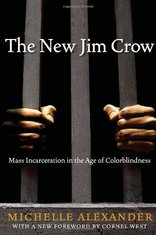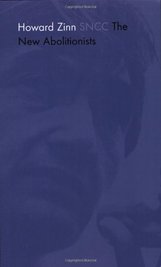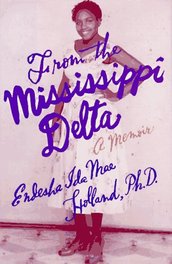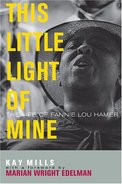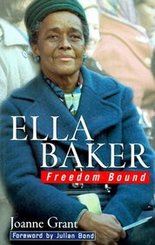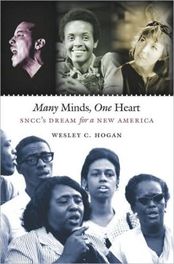
Many Minds, One Heart: SNCC's Dream for a New America
by Wesley C. Hogan
The following is an excerpt chosen by Karen from the book:
Sweat beaded on twenty-one year old Charles McLaurin's forehead as he opened the car door and got out. His stomach felt weak, his knees unsure. What he call "the fear" was upon him. A handsome broad-shouldered man from Jackson, he stood up as three elderly women emerged from the back seat and started toward the courthouse on a hot August day in
1962. He stopped behind them, watching the pride with which they moved, the strong convictions that they held, "as if this was the long walk that led to the Golden Gate of Heaven, their heads held high." Earlier in the car, the women had told stories of the years gone by while McLaurin drove "with knees shaking, mouth closed tightly so as to not let them hear the fear in my voice." When they passed through Sunflower , Mississippi, one of the women said, "Won't be long now." McLaurin's heart jumped, realizing what danger could lie ahead for us, especially me." The women, whose ages ranged from sixty-five to eighty-five, "knew the white man and his ways, they knew him because they had lived with him, and worked for him". At the courthouse in Indianola, McLaurin stayed by the car as each woman walked up to the white registrar and said, "I want to vote."
McLaurin's peak moment [in the movement my addition] occurred when these three elderly ladies had acted in a way that gave him the "spirit to continue". He recognized the existence of a "slavery mentality" that kept people from registering, and he had learned in the movement that it was not just a black problem, but a human problem. It was a problem of submission- people are helpless when young and learn subservience to survive. The women McLaurin drove to the courthouse found a way to rise above this submission and attempted to reside in the world as free persons. So this is why McLaurin remembered that day in 1962. He fixed in his mind how to live.
by Wesley C. Hogan
The following is an excerpt chosen by Karen from the book:
Sweat beaded on twenty-one year old Charles McLaurin's forehead as he opened the car door and got out. His stomach felt weak, his knees unsure. What he call "the fear" was upon him. A handsome broad-shouldered man from Jackson, he stood up as three elderly women emerged from the back seat and started toward the courthouse on a hot August day in
1962. He stopped behind them, watching the pride with which they moved, the strong convictions that they held, "as if this was the long walk that led to the Golden Gate of Heaven, their heads held high." Earlier in the car, the women had told stories of the years gone by while McLaurin drove "with knees shaking, mouth closed tightly so as to not let them hear the fear in my voice." When they passed through Sunflower , Mississippi, one of the women said, "Won't be long now." McLaurin's heart jumped, realizing what danger could lie ahead for us, especially me." The women, whose ages ranged from sixty-five to eighty-five, "knew the white man and his ways, they knew him because they had lived with him, and worked for him". At the courthouse in Indianola, McLaurin stayed by the car as each woman walked up to the white registrar and said, "I want to vote."
McLaurin's peak moment [in the movement my addition] occurred when these three elderly ladies had acted in a way that gave him the "spirit to continue". He recognized the existence of a "slavery mentality" that kept people from registering, and he had learned in the movement that it was not just a black problem, but a human problem. It was a problem of submission- people are helpless when young and learn subservience to survive. The women McLaurin drove to the courthouse found a way to rise above this submission and attempted to reside in the world as free persons. So this is why McLaurin remembered that day in 1962. He fixed in his mind how to live.
